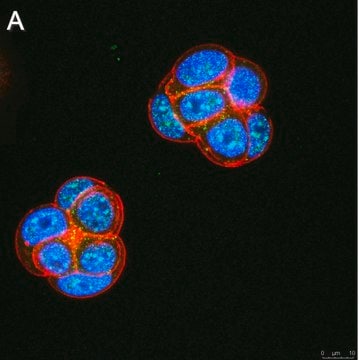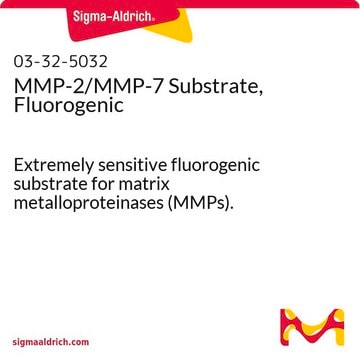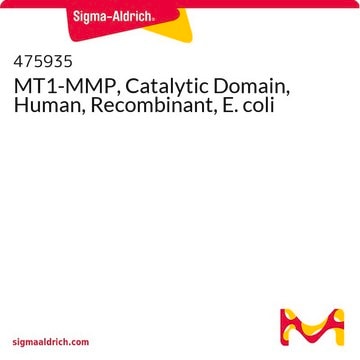ZRB1484
Anti-ACC1 Antibody, clone 1J8 ZooMAb® Rabbit Monoclonal

recombinant, expressed in HEK 293 cells
About This Item
Javasolt termékek
biológiai forrás
rabbit
Minőségi szint
rekombináns
expressed in HEK 293 cells
konjugátum
unconjugated
antitest forma
purified antibody
antitest terméktípus
primary antibodies
klón
1J8, recombinant monoclonal
leírás
recombinant, expressed in HEK 293 cells
termékcsalád
ZooMAb® learn more
form
lyophilized
molekulatömeg
calculated mol wt 265.55 kDa
observed mol wt ~260 kDa
tisztítva
using Protein A
faj reaktivitás
human, mouse
faj reaktivitás (homológia által előrejelzett)
monkey
kiszerelés
antibody small pack of 25 μL
környezetbarátabb alternatív termék tulajdonságai
Waste Prevention
Designing Safer Chemicals
Design for Energy Efficiency
Learn more about the Principles of Green Chemistry.
fejlettebb validálás
recombinant expression
Learn more about Antibody Enhanced Validation
sustainability
Greener Alternative Product
technika/technikák
affinity binding assay: suitable
immunohistochemistry (formalin-fixed, paraffin-embedded sections): suitable
western blot: suitable
izotípus
IgG
epitóp szekvencia
C-terminal
Protein ID elérési szám
UniProt elérési szám
környezetbarátabb alternatív kategória
kiszállítva
ambient
tárolási hőmérséklet
2-8°C
célzott transzláció utáni módosítás
unmodified
Általános leírás
Egyediség
Immunogen
Alkalmazás
Evaluated by Western Blotting in A431 cell lysate.
Western Blotting Analysis: A 1:1,000 dilution of this antibody detected ACC1 in A431 cell lysate.
Tested applications
Western Blotting Analysis: A 1:1,000 dilution from a representative lot detected ACC1 in HepG2 and C2C12 cell lysates.
Affinity Binding Assay:A representative lot of this antibody bound Acetyl-CoA carboxylase 1 (ACC1) with a KD of 2.0 x 10-8 in an affinity binding assay.
Immunohistochemistry (Paraffin) Analysis: A 1:100 dilution from a representative lot detected ACC1 in human kidney tissue sections.
Note: Actual optimal working dilutions must be determined by end user as specimens, and experimental conditions may vary with the end user
Cél megnevezése
Fizikai forma
Feloldás
Tárolás és stabilitás
Jogi információk
Jogi nyilatkozat
Nem találja a megfelelő terméket?
Próbálja ki a Termékválasztó eszköz. eszközt
Tárolási osztály kódja
11 - Combustible Solids
WGK
WGK 1
Lobbanási pont (F)
Not applicable
Lobbanási pont (C)
Not applicable
Analitikai tanúsítványok (COA)
Analitikai tanúsítványok (COA) keresése a termék sarzs-/tételszámának megadásával. A sarzs- és tételszámok a termék címkéjén találhatók, a „Lot” vagy „Batch” szavak után.
Már rendelkezik ezzel a termékkel?
Az Ön által nemrégiben megvásárolt termékekre vonatkozó dokumentumokat a Dokumentumtárban találja.
Cikkek
Learn about the hallmarks of cancer and find reliable ZooMAb® recombinant antibodies to study them, conveniently organized by cancer hallmark.
Tudóscsoportunk valamennyi kutatási területen rendelkezik tapasztalattal, beleértve az élettudományt, az anyagtudományt, a kémiai szintézist, a kromatográfiát, az analitikát és még sok más területet.
Lépjen kapcsolatba a szaktanácsadással








